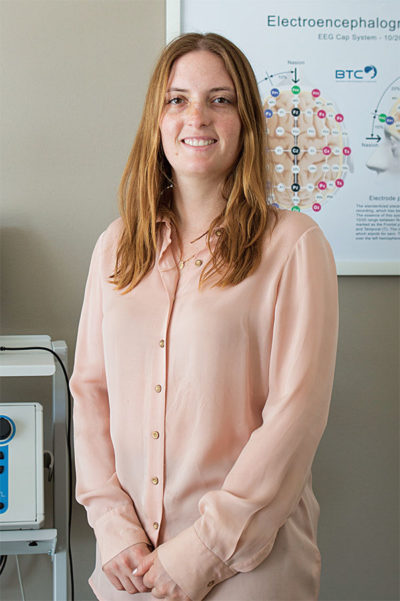
Photo: Alicia Vera
Magala Martin ’17 at the Brain Treatment Center in Monterrey, Mexico
Andres Martin’s cognitive decline “sprung out of nowhere” about five years ago when he was 17, says his older sister, Magala ’17. He gradually went from being a healthy teen to not speaking, not sleeping, and barely moving.
“He had what they call a cognitive collapse,” says Pedro Martin, the oldest of the three Martin siblings. “The front part of his brain stopped working efficiently.” The Martins, including father Pedro, a Global Advisory Board member, and mother Magala, live in Mexico, but for months the family traveled around the U.S. in search of a treatment. They tried well-known hospitals on the East Coast, but nothing seemed to work. Eventually, a doctor recommended the Brain Treatment Center (BTC) in Newport Beach, California.
Affiliated with the USC Neurorestoration Center, the BTC developed what it calls Magnetic e-Resonance Therapy, an individualized, noninvasive treatment that aims to help the brain’s communication networks function better, potentially providing a number of health benefits, from better sleep to reduced stress to clearer thinking and more. The parents met with the founder, Dr. Yi Jin, and decided to give the treatment a try. “My brother hadn’t slept in three weeks,” says Magala. “After the first treatment, he slept for 12 hours.”
For about nine months, Andres received treatments, and he steadily improved. “He started to speak again. I hadn’t spoken to my brother in four months. It was a huge step,” says Magala. “He started to eat again. Then he started making sentences, and he started realizing what had happened. Now he speaks perfectly.” Brother Pedro notes that some of Andres’ cognitive functions could still improve. “But before and after treatment, he is completely different,” he says.
The family was so impressed with the improvements in Andres that they talked with Jin about opening a facility in Mexico. Magala, then a second-year student, put together a business plan with the help of her Babson professors, and in the summer of 2014, her parents presented to the BTC board. “They loved it, and we bought a license,” she says.
Magala wanted to help the family launch its venture. So instead of heading back for her junior year, she took a year off to work with her brother, Pedro, and mother to set up operations. In the fall of 2014, the Martins opened a BTC in Mexico City, followed by another in Monterrey.
Currently, Pedro runs both BTCs along with their mother, who serves as CEO. Magala helps with finances but has taken a full-time job with Tim Hortons, the Canadian restaurant chain. “It’s my ultimate goal to go back. I just thought that I needed a better foundation,” she says. “Working with my family, we have a good relationship. It’s also very heartwarming to be a part of this.”
Pedro, too, draws satisfaction from helping others. “When you are dealing with neurological illness, it feels like you are in a very dark room, for the person and the family,” he says. “We want to be an important part of Mexico’s mental-health industry. We did this because we know how it feels to be in that dark room. And this is a light that helps you find a way out.”—Donna Coco
